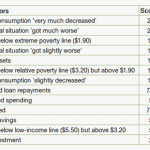The COVID-19 Pivot: How Five Nonprofits and Community-Based Enterprises Have Adapted in Response to the Pandemic
As COVID-19 has upended entire industries, businesses everywhere, from small to large, have had to adapt to survive. Many nonprofit organizations have also undergone huge adjustments, both to better serve their communities and just to stay afloat. Many have completely shifted from their traditional services to offer new programs that address the pressing issues of COVID-19.
As a foundation with a 20-year history of supporting nonprofits, the Vodafone Americas Foundation is committed to helping these frontline organizations continue to affect change.
Part of this support has involved awarding a total of $50,000 ($10,000 to each organization) in funding to five selected participants in the OpenIDEO COVID Business Pivot Challenge. Run by OpenIDEO, a platform that develops innovative solutions to social and environmental issues, the challenge sought to reward organizations that have rapidly adapted to meet the needs created by COVID-19.
With unemployment at its highest in years and impoverished countries suffering a tremendous disadvantage in combating the virus, the importance of support from foundations and other funders cannot be overstated. Business challenges can help highlight the great flexibility and thoughtfulness that both for-profit and nonprofit organizations have demonstrated as they work to overcome the issues brought by COVID-19. Through the challenge, we uncovered creative, innovative and inspirational solutions from global nonprofits, civil society, community-based organizations and for-profit enterprises. The challenge winners have a diverse range of focus areas, geographies and missions. The one thread they have in common is their ability to quickly pivot and adapt to meet new demands, provide new services and prepare to serve a new future. Below, we’ll explore some of the solutions they’re developing to the current crisis.
Crowdfunding to help families pay rent
When lockdown orders confined much of the U.S. to their homes, paying rent became a challenge for many. Since the pandemic started, a new BankRate survey finds that Americans’ largest financial regret (expressed by 23% of respondents) is not having enough emergency savings. Other top responses included not having enough retirement savings, and having too much debt.
Even before the pandemic, many families were grappling with financial hardships. As people lost incomes to the economic effects of the health crisis, eviction soon became a new reality, with many unable to pay rent. In response, Georgia-based New Story, whose mission is to fight global homelessness, created a local campaign to assist and support their community: PayTheirRent.Org, a crowdfunding platform that allows individuals to pay a portion of the rent for families in need. The platform directs 100% of monthly donations to help families pay their rent and not lose their homes.
This program has enabled New Story to provide housing to 200 families, and it is using its proprietary technology to help other organizations find and screen additional families. Through the challenge, Vodafone Americas Foundation awarded New Story more funding to continue providing safe housing to families impacted by the crisis.
Crowdsourcing data to get assistance to those in need
To best serve those in need, an organization must understand where help is needed. Just as importantly, citizens must also be aware of the resources available to them during times of hardship. To that end, Reap Benefit, an organization based in India, created a COVID Rapid Response Platform: a crowdsourced network that supports citizens by working with the government to provide needed services to the community.
Reap Benefit focuses on delivering local relief (e.g.: community health, food security, income support) through crowdsourcing, data analysis and hyperlocal volunteering in India. Through the use of data and analytics, volunteers are able to map hotspots of people in need and then supply that information to the local government to ensure that these citizens receive needed supplies.
The platform also assists civil society organizations with last-mile delivery and provides a single source of information for citizens (about testing locations, shelter homes, free food supply shops, etc.), while tracking the status of need fulfillment.
In times of crisis, the distribution of supplies to those in need poses a huge challenge. Reap Benefit’s work showcases the potential of utilizing an existing technology to meet new needs, and the importance of working closely with local governments to best serve the immediate needs of the community.
An organization’s mission becomes a continent’s essential workforce for COVID-19
Before the pandemic, Mothers2Mothers, a mentor program in Africa, employed local women living with HIV as frontline health workers to address gaps in this crucial workforce. As soon as countries in Africa started to implement lockdowns, the Mothers2Mothers mentors became essential frontline workers in another effort – aiding their communities in the fight against COVID-19.
Mothers2Mothers quickly pivoted their approach by developing the Virtual Mentor Mother Program, an initiative put in place to respond to the need for COVID-related health services at scale. The organization collects data from the frontlines and shares it with local governments to continually monitor developments in the field. Its efforts include mapping the progress of the disease and its emerging hot spots, and adapting in real-time to deliver precision interventions.
Mothers2Mothers had created a force of healthcare providers in Africa before the pandemic took place. Now, those trained providers have become first responders in a continent with a health worker shortage of 4.2 million. This organization provided both a solution to an ongoing problem in Africa and an immediate response to COVID, offering a strong example of why organizations like these must be supported.
Creating food supply chains in the face of COVID-19
COVID has tested every facet of society’s daily operations, food supply chains included. Many workers have fallen sick to the virus, leaving facilities with excess food and a smaller workforce to deliver it. The food supply chains in many countries were in urgent need of assistance, as facilities were forced to throw away food – mainly perishable produce – because of these operational challenges. In a world where hundreds of millions go hungry every day, the waste of produce is not acceptable.
AgUnity, a technology platform based in Australia, addresses this problem by enabling farmers to safely connect with buyers, ensuring uninterrupted food supply chains worldwide. The organization has spent the last four years creating award-winning technology designed to assist smallholder farmers around the globe. AgUnity combines expertise in blockchain technology and software development with a focus on remote community empowerment and education for behavioral change. Its unique approach to developing this technology involves working hand-in-hand with the very farmers who use it. This has enabled the company to gain significant insight into the daily lives and challenges encountered by many farmers in Africa, Southeast Asia and Oceania, and to build digital solutions that can help transform these challenges into opportunities.
AgUnity’s newly developed initiative, “AgUnity Response,” is helping farmers from around the world, particularly smallholders, gain direct access to the market. Since the pandemic struck, many farmers have been unable to conduct face-to-face transactions. Through AgUnity’s digital platform, farmers are now able to sell their produce to retailers directly and quickly.
Promoting entrepreneurship during lockdowns
Somo, an entrepreneurship accelerator operating in low-income urban communities in Kenya, offers entrepreneurship training that features digitized educational material and testing tools to ensure the availability of business training during this time of social distancing.
In response to COVID-19, they moved their training online, allowing entrepreneurs to access it in the comfort of their homes. Moving online has helped the program provide these entrepreneurs with content that enables them to develop sustainable businesses. The organization has also pivoted its training strategies and gamified its content, to teach trainees how to quickly adapt to the current market needs.
In order for entrepreneurs in low-income communities to have access to online training, a stable internet connection is needed – and many of these communities do not have it. Currently, Somo is giving out data bundles to entrepreneurs to ensure access to their virtual content. The content is also accessible on basic feature phones, making it available to entrepreneurs of all income levels. By creating this easy-to-access material, Somo can reach entrepreneurs in Kenya to help them continue running their businesses despite the current circumstances.
Before COVID-19, each of the organizations discussed above offered much-needed services within their communities. But as soon as the pandemic hit, their communities’ circumstances rapidly changed, and they were challenged to evolve to better suit the new nature and needs of their people. The innovative responses these organizations have developed serve as a reminder of the social impact sector’s resilience during difficult times. I encourage you to explore these and other organizations that have pivoted in response to the COVID crisis. If you are able, support them through donations so they can continue to address the needs of the people most vulnerable to the virus and its economic impact.
June Sugiyama is the Director of the Vodafone Americas Foundation.
Photo courtesy of Engin_Akyurt.
- Categories
- Agriculture, Coronavirus, Health Care, Social Enterprise, Technology



